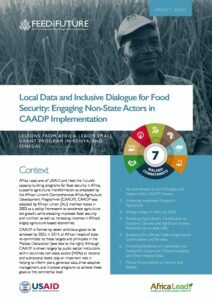The CAADP process is complex and far removed from subnational units – it should be explained, interpreted, and demystified for local stakeholders. Activities under the Small Grants Program (SGP) generated lessons that may benefit other NSAs working to engage with government at the subnational level in food security issues in Africa. In collaboration with partners, Africa Lead synthesized the learning into the following five lessons:
- The CAADP process is complex and far removed from sub-national decision-making. To be useful for bottom-up, locally-driven reform efforts, certain actors need to serve as translators that contextualize the framework and interpret commitments for stakeholders at sub-national levels. Not all aspects of CAADP are useful or relevant for local actors.
- It is possible and beneficial to mobilize citizens from the community and village level to contribute to the prioritization, design, and monitoring of agricultural investments at sub-national levels.
- The capacity of citizens to contribute to a data-driven approach to prioritization, monitoring, and planning agricultural activities at the sub-national level should not be underestimated. This approach requires relatively little investment, but adds significant value to the quality of decision-making.
- Policy makers and rural communities tend to prioritize infrastructure projects over investments in agriculture. While this issue ultimately depends on political will, NSAs can help highlight the return on investment for agriculture projects and generate evidence on the impact on food security and nutrition outcomes.
- Since most agricultural activities are implemented at the community levels, the partnership between citizens and local government is critical. When government leadership at the local level is open
and receptive to collaboration with NSA, there is a unique window of opportunity for reform and for achieving effective results for grassroots communities through collaborative governance.
